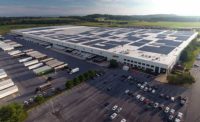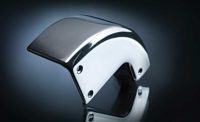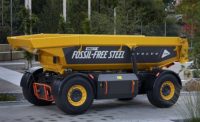1 // DEERE TAKES ADVANTAGE OF 3D PRINTING
Fifteen years ago, Deere & Co. engineers mostly used 3D printing to make prototypes of plastic parts. The company owned one printer, and it took up about 4 square feet. Today, the company’s Additive Manufacturing Lab in Moline, IL, spans more than 1,000 square feet and is equipped with both plastic and metal 3D printers.
Tooling is one of the biggest applications for additive manufacturing at the company. Deere’s tooling competency group has deployed more than 40 3D printers companywide.
Now, the company is investigating how to use the technology to make production parts. “We’re looking at a situation where we could make spare parts on demand,” predicts Chris Myers, global director of John Deere’s Tractor Platform Engineering. “Someday, dealers could have this technology, and then we [will be able to meet] a customer’s uptime concerns immediately.”
Myers is particularly intrigued by technology’s ability to produce parts with unconventional shapes and designs. “Additive manufacturing [will] enable us to go beyond the traditional manufacturing methods and get better performance as well as better packaging and more advantageous shapes,” he says.
2 // KUBOTA TO EXPAND GEORGIA ASSEMBLY PLANT
Kubota North America Corp. is investing $85 million to expand its assembly plant in Gainesville, GA. The project will establish a new engineering and design center at the site, which is expected to open in April 2022. The project marks Kubota’s fourth expansion in Georgia since 2013. The company already employs nearly 3,000 people in Georgia across manufacturing, sales, distribution and engineering operations.
3 // VOLVO ASSEMBLY PLANT BECOMES ZERO LANDFILL FACILITY
The Volvo Construction Equipment manufacturing campus in Shippensburg, PA, has achieved zero landfill status. It is only the second Volvo site worldwide to reach that goal. All waste generated at the site is now recycled, composted or converted to electricity. This includes day-to-day manufacturing operations, as well as office activities, equipment maintenance, and the on-site cafeteria. Employing more than 800 people, the site consists of seven buildings with a total area of more than 838,000 square feet.
In 2019, the site recycled 1,171 tons of cardboard, paper, wood, scrap metal and plastic. That equates to saving 4,248 mature trees, 3,323,689 kilowatt-hours of electricity, 3,757 tons of greenhouse gas emissions, or 769,300 gallons of water.
4 // CASE PLANT EARNS BRONZE FOR WORLD-CLASS MANUFACTURING
The CASE Construction Equipment assembly plant in Burlington, IA, has achieved bronze status in World Class Manufacturing (WCM). The plant manufactures loaders, backhoes, rough-terrain forklifts and dozers. Employing 600 people, the 1 million square foot plant has been assembling heavy equipment since 1937.
In the WCM program, factories are rated on how well they meet 10 technical and 10 managerial metrics. Each metric is scored on a scale of 1 to 5. A total score of 85-100 is world class; 70-85 is gold; 60-70 is silver; and 50-60 is bronze.
5 // $791 bILLION
Sales generated annually by U.S. manufacturers of construction, mining, and agriculture equipment, according to a new report from the Association of Equipment Manufacturers.







